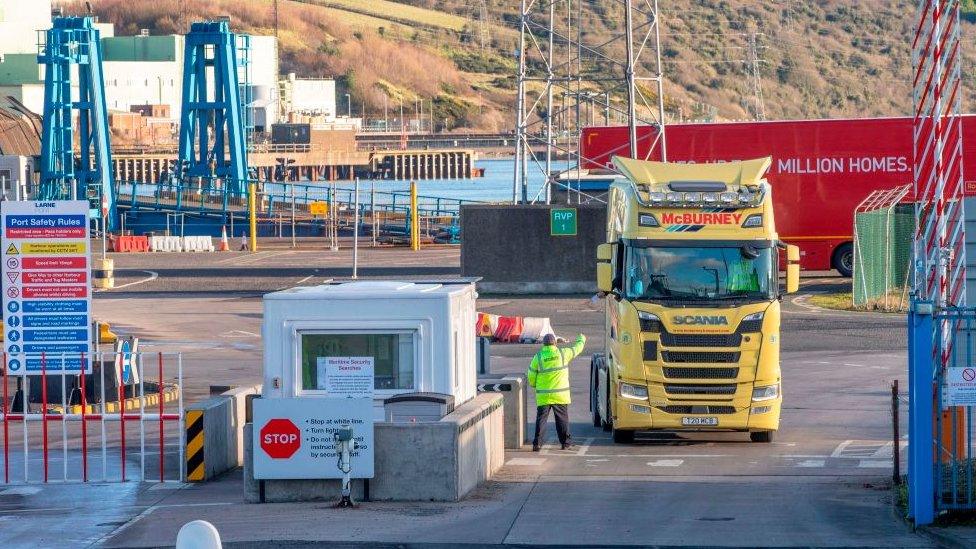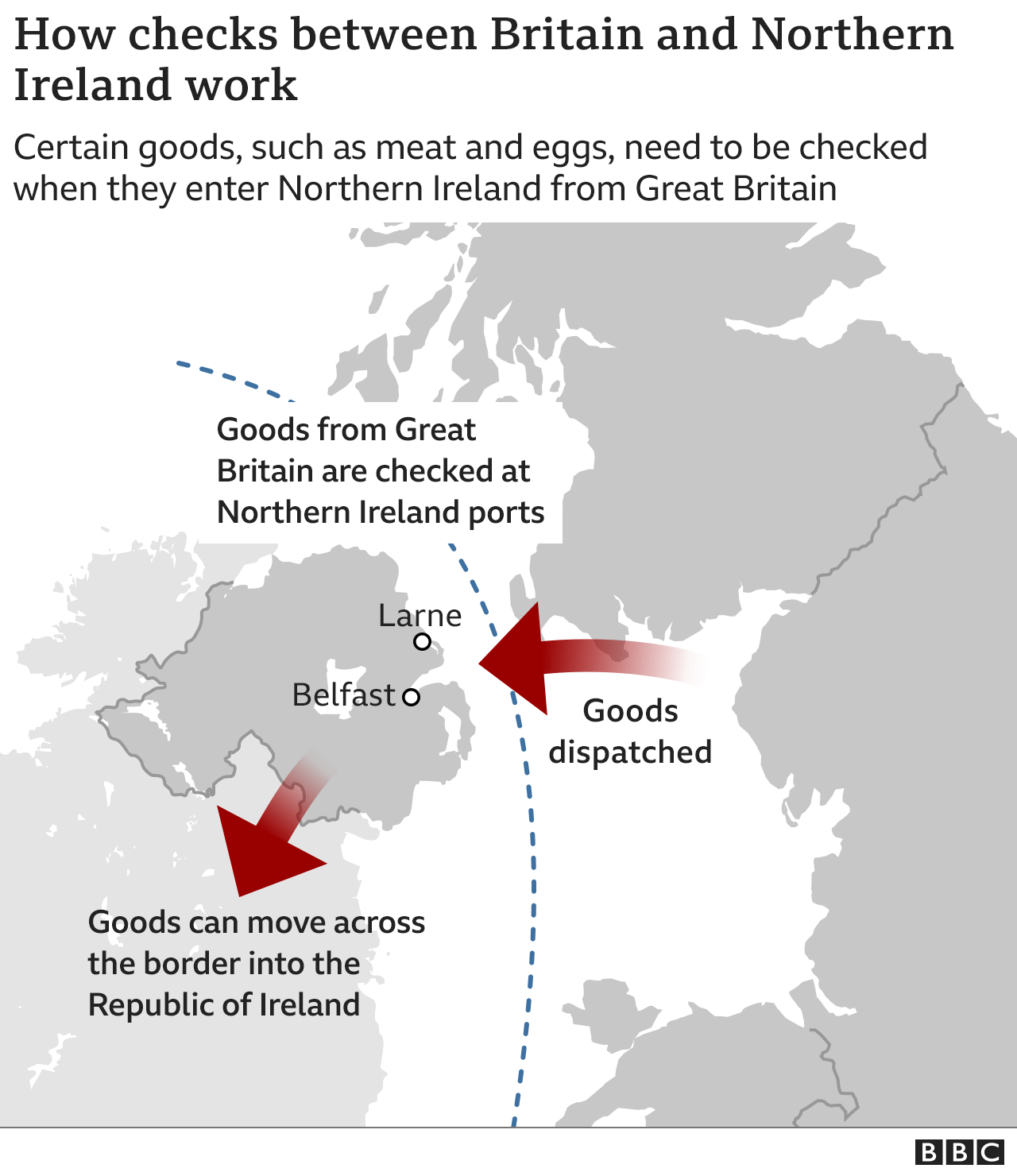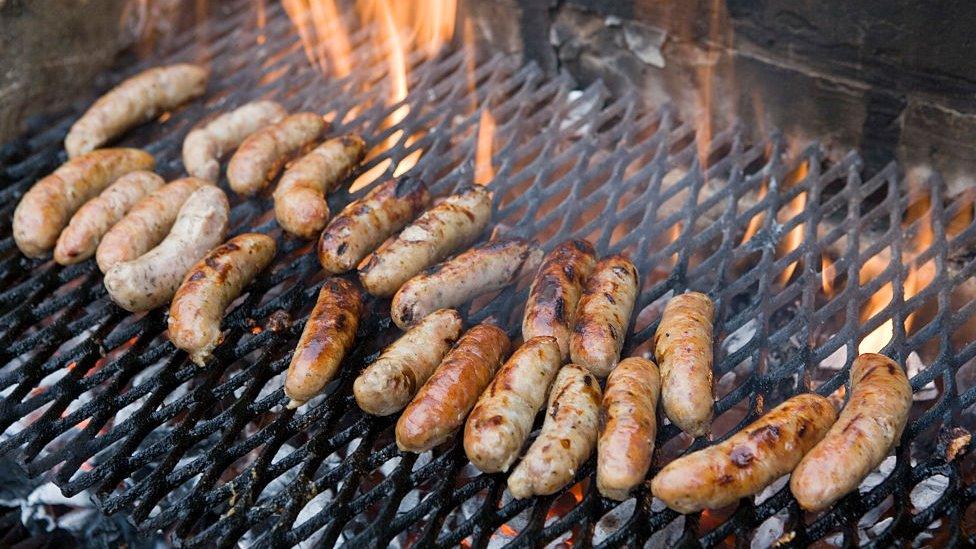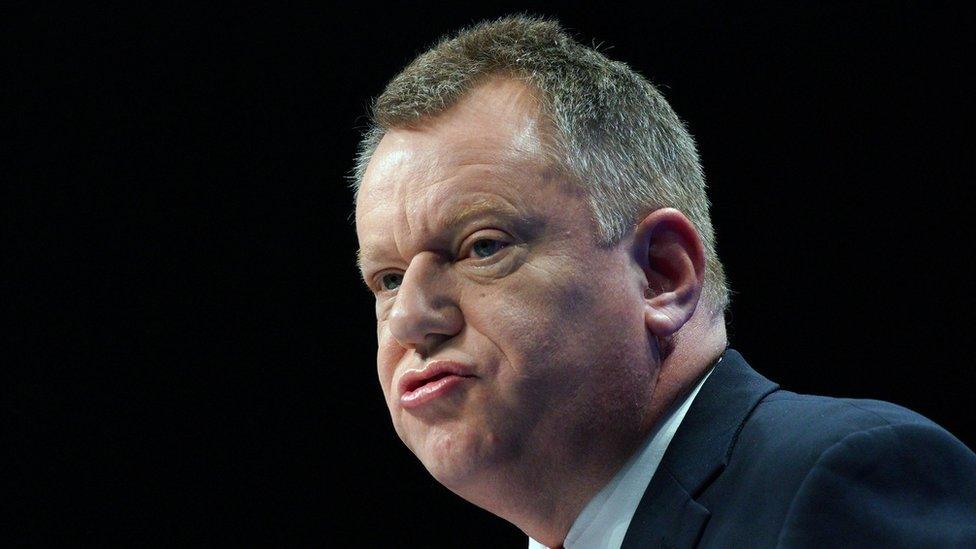Brexit: UK would be 'reckless' to use Article 16, says taoiseach
- Published

If the UK used Article 16 to suspend most controls on goods going from GB to NI that could cause problems for Ireland
Taoiseach (Irish PM) Micheál Martin has said it would be "irresponsible and reckless" for the UK to use Article 16 of the Northern Ireland Protocol.
It is the provision which allows parts of the protocol to be unilaterally suspended if they are causing serious difficulties.
The UK government said in July it believed the threshold for using Article 16 had been reached.
There is growing speculation that the UK will trigger it in the coming weeks.
Last month UK Brexit Minister Lord Frost said: "We would not go down this route gratuitously or with any particular pleasure."
Speaking in the Dáil (Irish parliament), Mr Martin said such a move would have "far reaching implications" for the relationship between the UK and EU.
He said it would also not be "in accordance with the spirit of partnership that has informed the peace process".
Allow X content?
This article contains content provided by X. We ask for your permission before anything is loaded, as they may be using cookies and other technologies. You may want to read X’s cookie policy, external and privacy policy, external before accepting. To view this content choose ‘accept and continue’.
That also creates a new trade border between Northern Ireland and the rest of the UK, something the EU accepts is causing difficulties for many businesses.
The EU has proposed measures to ease the checks and controls while the UK is demanding a fundamental reform of the protocol.
If the UK was to use Article 16 to suspend most controls on goods going from GB to NI that could cause significant problems for Ireland.
It could reopen questions about goods being controlled as they cross the Irish border or as they leave Ireland for the rest of the EU.
Both those scenarios would be deeply unpalatable for the Irish government.
Article 16 measures can be taken if the protocol is leading to serious "economic, societal or environmental difficulties" that are liable to persist.


Additionally, it can be used if the protocol is leading to "diversion of trade", but there is no specific guidance on how that phrase should be interpreted.
A month's formal notice is supposed to be given before any action is taken, although immediate action is allowed in "exceptional circumstances".
The text of Article 16 says any measures should be restricted in both scope and duration and limited to what is "strictly necessary" in order to solve the problems.
Additionally, it says that priority shall be given to measures that will "least disturb" the functioning of the protocol.
Any measures are also supposed to be jointly reviewed every three months with a view to their abolition or limitation.
If the UK's actions create an "imbalance" between its rights and obligations under the protocol, then the EU can take "proportionate rebalancing measures".
These are not defined and would largely be determined by what the UK does.
The EU is understood to be preparing legal measures which, for example, could challenge the scope of the UK's Article 16 actions.
Ultimately, the EU could impose tariffs on UK goods but that would only be possible after a lengthy arbitration process.
No 'significant' fall in GB imports
Meanwhile, a senior trade economist has suggested that Northern Ireland has not experienced a significant fall in imports from GB due to the protocol.
Prof Martina Lawless was giving evidence to an Irish parliamentary committee.
She said the biggest change in trade patterns was Irish companies buying less from GB and more from Northern Ireland.
But she said goods going into Northern Ireland appear to be sourced in "more or less the same direction" as before.
She conceded that is a "speculative" analysis due to the lack of up-to-date official figures on trade between Great Britain and Northern Ireland.
The EU has proposed measures to ease the checks and controls while the UK is demanding a fundamental reform of the protocol.
Surveys by business groups have suggested there have been significant falls in Great Britain to Northern Ireland trade in some sectors.
'Large increase' in Ireland to NI imports
Last week a survey by the Food and Drink Federation suggested large GB food manufacturers had seen sales to Northern Ireland fall by an average of 10% this year.
Prof Lawless suggested that overall the shift away from Great Britain sourcing in Northern Ireland had not been dramatic.
She based her analysis on official Irish government figures, which track monthly trade flows between Ireland, GB and Northern Ireland.
She said there had been "a very large increase" in imports into Ireland from Northern Ireland as Irish companies switched sourcing away from Great Britain.

Chilled meats - including sausages - are not allowed to enter the EU.
Irish exports to Northern Ireland have also risen but Prof Lawless said they have increased by "a much smaller amount".
"It does suggests goods going into Northern Ireland are still being sourced in perhaps more or less the same direction," she told the Seanad Select Committee on the Withdrawal of the UK from the EU.
"We haven't seen any great shift in supply in terms of Northern Ireland massively increasing what they buy from Ireland and the EU to replace goods from Great Britain.
"All of the change in trade from Northern Ireland has been them selling more into Ireland and the EU market rather than having to buy more from it," she added.
- Published1 November 2021

- Published2 February 2024
